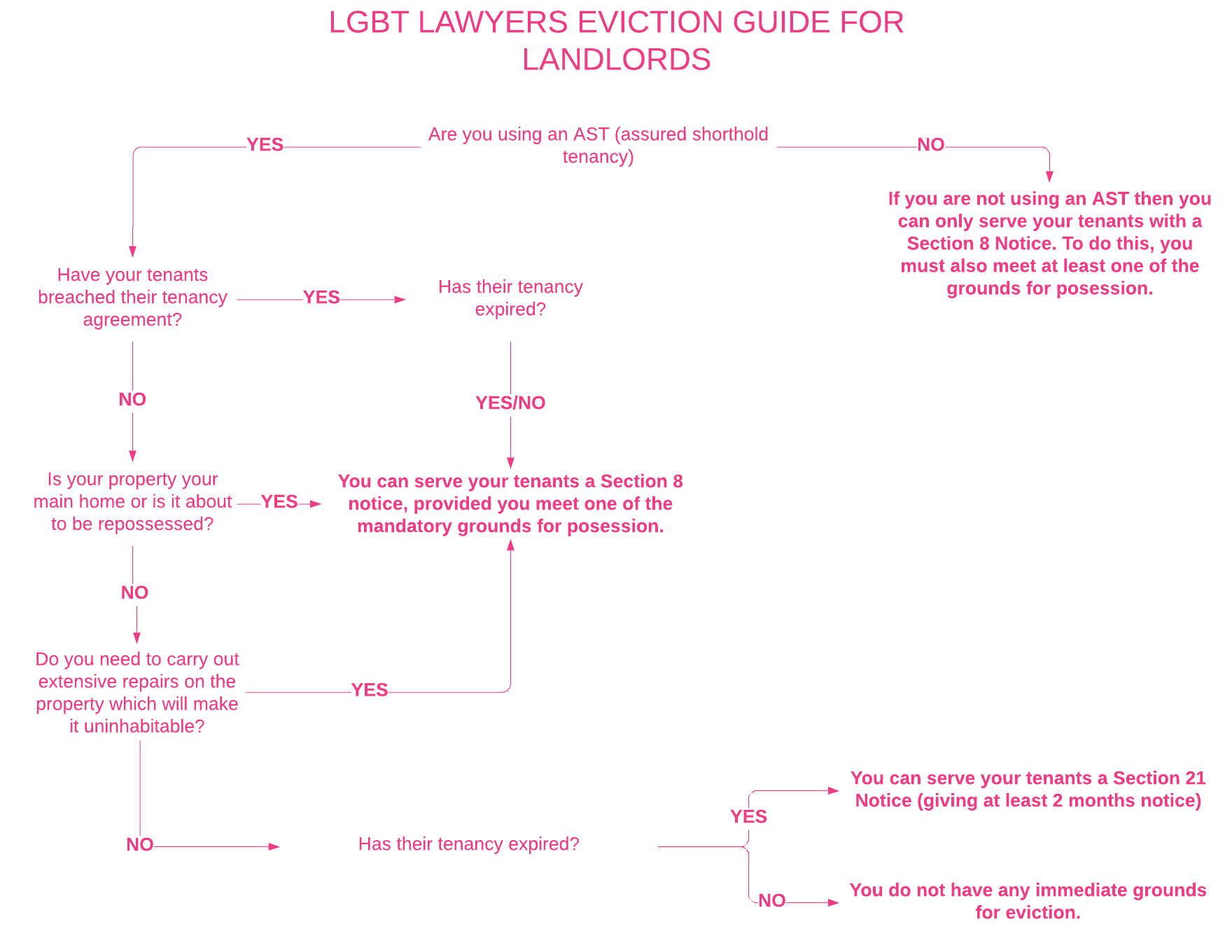Home / Legal Areas / landlord & tenant / eviction
eviction
If you are a tenant who has received an eviction notice or a landlord who is intending on giving an eviction notice, you will need a lawyer for support and advice. It is an illegal eviction if you are forced to leave your home without the correct procedures being followed, so to ensure the eviction is followed properly and legally, it’s always best to seek legal assistance.
Call Today
020 3795 9020
Our Email
INFO@LGBTLAWYERS.CO.UK
Our Address
39 CHURCH ROAD, HOVE, BN3 2BE
Contents for Eviction
1. What Does it Mean to Evict Someone?
4. How a Lawyer Can Help During Eviction
What Does It Mean To Evict Someone?
Eviction is the forced removal of a commercial or residential tenant from a property by their landlord. There doesn’t have to be any wrongdoing on the tenant’s behalf for them to be evicted, however this is a common occurrence in many eviction cases.
The most common causes of eviction include:
- A landlord looking to recover their property for themselves
- Failure by the tenant to comply with their contract (section 8)
- Late or non-payment of rent
- Unauthorised sub-letting
- Antisocial behaviour
It’s important to note that a landlord cannot evict a tenant without following the correct process, and issuing the correct eviction notice.
Eviction Notices
When it comes to eviction, a landlord must follow the prescribed process to evict their tenant. This process begins with issuing either a Section 8 or Section 21 eviction notice. Issuing an incorrect notice will result in the process halting at the very start. For reference, the correct notices to use are:
Section 8 notice – used when a tenant has broken the terms of their tenancy
Section 21 notice – used either at the end of a fixed-term tenancy or to end a rolling tenancy
While issuing an eviction notice is the first step towards evicting a tenant, it’s by no means the last. And issuing the notice also doesn’t mean the tenant is guaranteed to be evicted.
You should know…
Due to the current coronavirus pandemic, the regulations surrounding eviction are slightly different.
From June 2021, eviction legislations are starting to get back to normal. The government have now given bailiffs the green light to enter homes and to start re-possessing. The notice for a section 21 eviction has been reduced from a minimum of a 6-month notice, to now a minimum of 4-month notice. The notice period for a section 8 eviction will depend on which grounds the tenancy has been broken. See our articles on section 21 and section 8 notices for more information.
The Eviction Process
Serving Notice
As mentioned, the correct eviction notice must be served at the start of the process. If issuing a Section 21 notice, you should be mindful of restrictions around using them.
Normally, any eviction notice must be served 2 months in advance of the intended date of eviction. Due to coronavirus regulations, this period is now 6 months.
Enforcing the Eviction With a Possession Order
Once the eviction notice has been correctly served, you’ll need to apply for a possession order. There are two types of possession order:
1. Standard possession orders are used when the tenant is in rental arrears
2. Accelerated possession orders are used when there are no rental arrears, but the tenant has not left the property on the date specified in the eviction notice
In each case, tenants have 14 days in which to challenge an application for possession. A judge will then look at each possession order and decide whether a hearing is required, or whether to simply approve or reject the application for possession.
After this, the tenants will be required to vacate the property by the date specified in the possession order.
Failure to Vacate
It’s not unusual for tenants to refuse to leave a property even after a possession order is granted to a landlord.
In this situation, landlords will need to apply for a warrant for possession to re-gain their property.
Once a warrant for possession is granted, if the tenant still hasn’t vacated the property by the required date, the landlord can send in bailiffs to forceably evict the tenant.

*The above flowchart is a guide for the eviction process outside of the revised eviction regulations during the 2020/2021 Coronavirus pandemic. For more information on the eviction process during COVID-19, please refer to the GOV website.
You should know…
Landlords must ensure they follow the correct process of eviction. Failing to do so can result in claims for harassment, or even a counter claim for damages by the tenant.
Landlords cannot and should not forcibly try to remove tenants themselves or change the locks to the property, nor should they cut off utilities or refuse to carry out repairs to the property.
Doing so is likely to result in a criminal harassment claim.
How a Lawyer Can Help During Eviction
The main reason evictions fail to proceed is a failure to follow the correct eviction process.
For landlords, an experienced landlord and tenant lawyer will know how to ensure you serve the correct notice, fill the correct forms and adhere to guidelines when making an eviction.
For tenants, having a lawyer on side means if your landlord tries to illegally remove you from your property, you understand how, and what evidence you need to provide to prove the eviction doesn’t meet requirements.
A good lawyer should always give objective advice. This is especially important when it comes to advising tenants who may otherwise face a situation where they are spending thousands of pounds on legal costs with little hope of staying in their property.
Sometimes the best course of action can be to simply vacate the property.
NEED An EVICTION LAWYER NOW?
Get in touch today by giving us a few details and a brief outline of your matter, and we’ll put you in touch with an LGBT Lawyer.
OTHER LEGAL AREAS
CIVIL LITIGATION
CRIMINAL DEFENCE
DISCRIMINATION
EMPLOYMENT DISPUTES
FAMILY LAW
IMMIGRATION
WILLS & PROBATE
landlord & tenant: latest blogs and insights

How to Evict a Tenant: A Guide for Landlords
How to Evict a Tenant | Read Time 5 Minutes.If you're a landlord and you're having issues with your tenant, you may be able to serve an eviction notice. Eviction is the court-ordered removal of a tenant from a property. There's more than one way to evict a tenant....
EVICTION Not Right For Your Situation?
Haven’t been able to find the information or solution you were looking for? Here are all the landlord & tenant services on offer from the LGBT Lawyers network.
FREEHOLD PURCHASES

LEASE REVIEWS AND RENEWALS
LEASEHOLD ENFRANCHISEMENT
RIGHT TO MANAGE REQUESTS
TENANCY DISPUTES

The LGBT Lawyers Difference
At LGBT Lawyers we tailor our legal services specifically to the LGBT community and everything that being LGBT entails. As an LGBT individual you deserve legal advice that is free from any attitude or judgement. Our network of regulated and qualified LGBT Lawyers will ensure your legal requirements are met.
LGBT Lawyers earnt its fantastic reputation from its fearless commitment to Our clients’ cases
Call Today
020 3795 9020
Our Email
INFO@LGBTLAWYERS.CO.UK
Our Address
39 CHURCH ROAD, HOVE, BN3 2BE
NEED An EVICTION LAWYER TODAY?
Please give us a few details and a brief outline of your matter, and we’ll put you in touch with an LGBT Lawyer.



